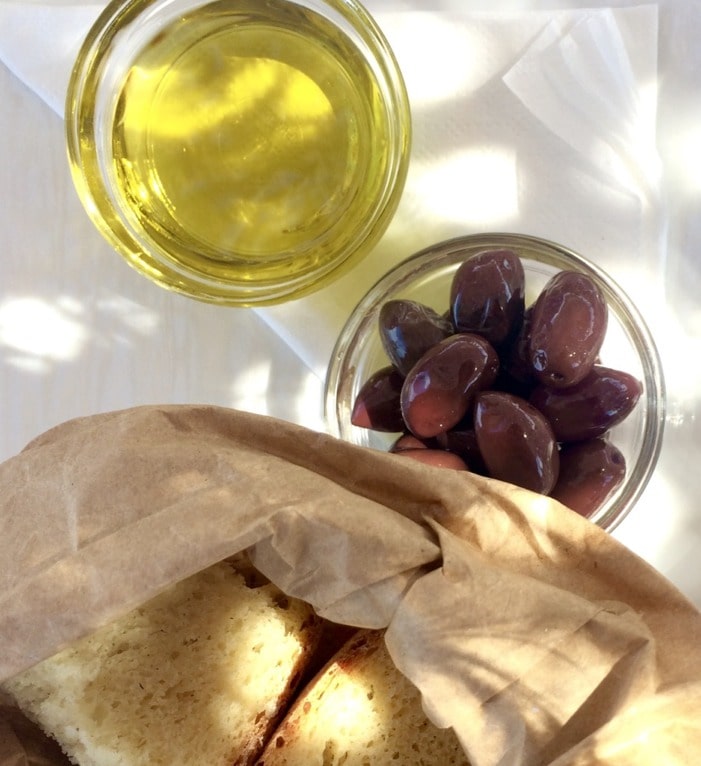Adding This Ingredient to Your Meals May Protect from Diabetes, According to Researchers

By Contributor Janet Brancato, MS, RDN
We know from previous studies that the Mediterranean diet is associated with a reduced risk of diabetes. In a new review, researchers found that olive oil, a main component of the diet may decrease the risk of diabetes by 13%.
In their recent analysis in the journal “Nutrition & Diabetes”, the researchers wanted to investigate the impact olive oil has on the management and prevention of diabetes. They compiled and reviewed multiple studies linking olive oil with the prevention and management of type 2 diabetes. Extra virgin olive oil is the primary source of fat in the Mediterranean diet. It is high in monounsaturated fats (good fats), and polyphenols known for their antioxidant and anti-inflammatory benefits. In the review it was found that the risk of type 2 diabetes decreased by 13% with increasing olive oil up to 15-20 grams per day.
Research also suggested that replacing carbohydrates (5-10 % of total intake) with monounsaturated fats is also a positive lifestyle practice for other risk factors of diabetics. Using olive oil specifically was highlighted to reduce risk for mortality, stroke, and cardiovascular occurrences. It has been shown to also improve glucose control improving HbA1c, which measures your average blood sugar over the past 2-3 months. The reduction of HbA1c by 0.1% is estimated to reduce cardiovascular disease by 7%.
Extra virgin olive oil has other components making it an oil not equal to other plant oils. The review seems to indicate that the polyphenol components in olive oil set it apart from other oils and affect glucose breakdown with inhibiting carbohydrate digestion and absorption.
In other words, adding a couple of tablespoons of olive oil to your diet may have a significant impact on diabetes risk. Including olive oil in your diet is easy, it tastes great, it imparts flavor to vegetable dishes and it upgrades the nutritional value of your meal. Apart from cooking with it, here are 10 easy ways to increase your olive oil intake: Aim to include 2-3 Tablespoons per day-
1. Dress your vegetables and salads with olive oil.
2. Replace butter and other fats with olive oil.
3. Dip wholegrain bread in olive oil—add some fresh herbs to add extra flavor.
4. Cook your eggs in olive oil—drizzle some olive oil in the pan before cooking your eggs.
5. Use olive oil in sauces, dips, and marinades—it is great in a pesto sauce or hummus.
6. Drizzle olive oil on fish or meats before grilling.
7. Drizzle olive oil over grilled fruit, and then top with fresh mint & lemon zest.
8. Add on top of a sweet potato instead of butter or sour cream.
9. Toss with tuna, & a squeeze of lemon sprinkled with dill.
10. Infuse your olive oil with fresh herbs like rosemary, thyme, oregano, and garlic for extra flavor added to dishes.
Photo by Elena Paravantes © All Rights Reserved


Having worked with lots of diabetics, it is always a hard sell telling them to eat more fat, but the research is there which definitely helps. Once they discover what the real Mediterranean Diet is and that they can eat amazingly delicious food, then they are sold! Thanks for another great article!
Thanks Bill!
Good news!
At this very moment I’m eating rapini sautéed at a low temperature in extra-virgin olive oil (Lefas, if I recall, a genuine but workhouse brand sold in 3L cans), along with mild Spanish onion, garlic and fine slivers of red sweet peppers. Then I added some Canadian goat “feta” (it would not be considered feta in the EU as it wasn’t made in Greece, but it is made by Greeks here and is 100% goat’s cheese) and an extra tablespoon of a better extra-virgin oil imported by the family that owns PA, a Greek supermarket in Mtl. I’m just having a tapas-sized dish.
I don’t know whether rapini is eaten in Greece, but it doesn’t matter; one can do this with any dark-green vegetable, including those that people forage for in Greece and southern Italy.
Yes, the Mediterranean diet is using vegetables that are available and seasonal in your location.